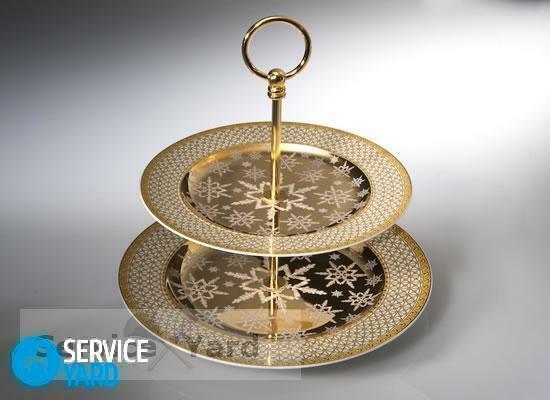
- Types of dishwashing detergents
- Household cleaning chemicals for dishwashing
- Natural dishwashing detergents
- Useful advice
Few people use disposable tableware at home, so the question of which dishwashing detergent is better is always relevant. The shelves in the shops are filled with such a variety of products suitable for this purpose, that the choice can sometimes be very, very difficult, and the people's means also do not lose their relevance. What is really better? Detergent for dishes from a popular manufacturer? Natural washing-up liquids? And anyway, what means for washing utensils is the safest? Our specialists understand this in this article.
to the table of contents ↑Types of dishwasher detergents
 It is possible to distinguish quite clearly all existing versions for today into 2 groups:
It is possible to distinguish quite clearly all existing versions for today into 2 groups:
- natural dishwashing detergents, they are also folk;
- household chemicals.
Important! What to give preference to quickly and efficiently cope with such routine daily work, and at the same time not to harm your health and your loved ones, the easiest way is to solve after a detailed study of all the advantages and disadvantages of each, and also having carefully studied the composition of the funds forwashing dishes.
to the table of contents ↑Household cleaning products for dishwashing
Almost everyone knows that folk remedies are much safer, but they do not go into details and give preference to more convenient options - they regularly buy detergent for dishes of any brand they like. Mainly adhere to such criteria:
- foaming;
- quality and speed of cleaning kitchen utensils;
- pleasantness of fragrance;
- consumption and time of use of one package.
Important! Ideally, we should add to this list such requirements as harmlessness, ecological purity or in general the naturalness of the components, and as a result - hypoallergenicity. Determine which dishwashing detergent is best for these criteria is not difficult. But for this you have to spend a little time and thoroughly study the composition of detergents for dishes. Modern gels, detergent concentrates, powders and liquid soap, intended for the cleaning of plates, cutlery, glasses, pots and pans, can include:
- Alkalis( carbonates, phosphates, atric silicates) - their amount affects the rate of fission of fats and othertypes of dirt.
- SAWS - harmful to human health and poorly washable by water components, but some of them prevent excessive contamination of dishes after washing, creating an invisible barrier film. That is, when you take food from such a plate, you taste with taste these same SAWs. According to GOST standards, the amount of such substances in the dishwashing detergent should not exceed 15%, but many manufacturers for ignoring the quality of the procedure ignore such regulations, thereby causing irreparable harm to your health.
- Bactericides - affect the speed of washing of complex protein compounds.
- Stabilizers - provide fast foaming.
- Diethanolamine - is present in all household products without exception, and also causes liver poisoning.
- Chlorine - by definition, gives a disinfectant effect, kills harmful bacteria on the dishes, but with the regular inhalation of its fumes you are guaranteed a headache, damage to the mucous eyes, difficulty breathing.
- Flavors are corrosive chemicals that help preserve a pleasant aroma on the dishes during washing. The principle of their operation is understandable - they settle on the surface and, of course, do not escape anywhere when you pour food on a plate or eat it.
Popular dishwashing detergents
When considering shelves with products for household use, pay attention to those dishwashing detergents which, according to the owners, are really effective and at the same time contain the permissible norm of all harmful substances:
- Fairy - this brand, undoubtedly, is in the lead in the rating. Excellent foams, grabs it for a long time, PAVs within 5-15%, does not cause allergies on the skin. About the amount of perfume information is not provided, that is, considering this point, one can only assume that everything is within the norm. Although some varieties are not always pleasant, but at the same time a sharp and even acrid smell, which indicates that the manufacturer sometimes overdo it with odors.
- Morning Fresh. Another means for washing dishes, but research shows that it is far from safe. The content of surfactants is from 15 to 30%.It is chosen by most consumers because of unobtrusive flavor and effective cleaning, without going into details of the composition.
- ASS.This dishwashing detergent at home is also in constant demand, but in principle it is not clear how it can get on the shelves in stores by its composition. Among harmful components it is worth noting not only surfactants( from 15 to 30%!), But also the salt of a complex acid, which can cause irritation of mucous membranes, skin and respiratory organs.
- Frosch. The products of this brand can not be found everywhere, but nevertheless, if you are looking for a more or less safe dishwashing detergent from the group of household modern chemistry, you can give it a preference. In the composition of harmful surfactants within the permissible levels of 15%, + less than 5% relatively safe, in minor amounts, dyes, lemon oil and aromatic additives are also present.
- Pril. This variant does not attract at all to its composition: up to 30% of surfactants, preservatives, complex flavors, antimicrobial and antifungal components for preservation, which can provoke persistent allergy and dermatitis. A complete list of all substances by the manufacturer is not indicated in terms of secrecy and prevention of theft of the prescription, but already the data that there is no doubt that Pril is not suitable as a safe detergent for washing dishes.
- Faberlic. Not a very popular option, but nevertheless, it becomes more and more fans among housewives. Pleasant unobtrusive aroma, convenient packing, concentrated consistency, because of what there is enough detergent for utensils for a very long time, excellent foaminess and hypoallergenicity are far from all the advantages of this solution. If we study the component composition more closely, we note that there are harmful impurities, but all within the permissible norm, perfume is less than 5%, the dye is food, plus there are natural ingredients in the composition that effectively cope with impurities - common salt and citric acid.
Natural detergents for utensils
 As if modern household chemicals were not good, how much time it did not save us, it can be called harmless only with a stretch, and even not all means. It is for this reason that, in the current environment and already inappropriate for a normal life of the environment, do not harm yourself even more, many return to proven folk safe means for washing dishes.
As if modern household chemicals were not good, how much time it did not save us, it can be called harmless only with a stretch, and even not all means. It is for this reason that, in the current environment and already inappropriate for a normal life of the environment, do not harm yourself even more, many return to proven folk safe means for washing dishes.
Important! All of them, if used correctly, are very effective, are much cheaper and do not pose any threat to your health. Therefore, the conclusion, which means for washing dishes is better - is obvious.
Popular popular dish washing aids
- Soda and salt. Perfectly suitable for cleaning plates from grease, for washing glass glasses, so that they are not divorced, to remove carbon deposits from frying pans.
- Sand and ash - perfectly absorb fat and remove soot.
- Mustard is a good option, you can use both the powder itself and prepare a paste for washing different dishes from it. The only drawback is that rags and sponges acquire a characteristic brownish shade after cleaning.
- Vinegar - splits the fat and removes the smell of fish, and the glass after washing in the vinegar solution will shine and the surface will not form a stain.
- Lemon juice or powder - whitens well and removes unnecessary odors.
- Calcined soda - copes well with burnt and heavily soiled dishes.
Natural safe dishwashing detergent
If you do not want to get the powder of the right type every time, and sometimes you need to dissolve the abrasive so as not to damage some coatings, use a more convenient option - a ready-made product. Make it in advance, pour into a suitable container and use as needed.
Recipe:
- Rub onto a small grater laundry soap - 100g.
- Dilute it with hot water - ½ cup.
- Stir well so that the soap is completely dissolved.
- Add in the mixture of soda - 75g or 3 tablespoons.
- Drop the essential oil( any) - a couple of drops to create a characteristic aroma.
- Mix everything well.
- The dishwashing detergent is ready.
Useful advices for
If you are still committed to modern dishwashing detergents, try to minimize their harmful effects. Observe the following rules:
- Carefully study the composition of dishwashing detergents before buying - give preference to more harmless.
- Wash gloves whenever possible.
- Well rinse each object - ideally at least 15 minutes.
- If the label indicates that it is a concentrate, be sure to dilute it before use, according to the specified proportion.
Now you know all the useful information about the existing ways of washing dishes. We hope that our advice helped you to understand among all the current diversity and you have already decided for yourself what kind of dishwashing agent is better.


